Demo Offers First Look At Coming Mobile, Cloud Apps

A host of startups along with a handful of old hands demonstrated a variety of mobile and cloud applications at this week's Demo Spring 2010, a semi-annual gathering of startups pitching their technology to potential venture and strategic investors.
At Demo, potential presenters went through a long application and vetting process by the show's organizer, VentureBeat. The lucky companies then got a grand total of six minutes on-stage to present their company and products.
It was fast. It was fun. And it was a chance to look at some of what might either be the hot applications of the coming year or the last hurrah of yet another entrepreneur who missed the market.
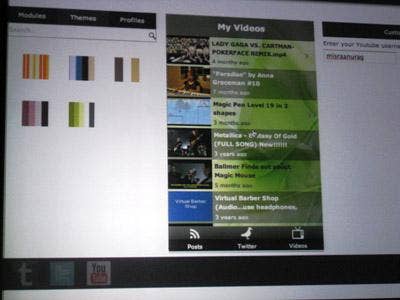
AppWhirl, Mountain View, Calif., demonstrated technology that CEO and Co-founder Richard Jordan claimed lets anyone make a mobile app within five minutes.
Users can go to the company's Website where they can access a number of modules that enable them to build applications that utilize such capabilities as blog posts and e-mail to work with a full range of content such as YouTube videos or Twitter feeds, Jordan said.
Once the app is done, AppWhirl will help users submit it to the appropriate app stores, Jordan said.

AppVoyage, San Jose, Calif., showed what CEO and Founder Sagar Golla called the first software-as-a-service (SaaS) platform for publishing rich mobile apps to multiple app stores.
AppVoyage lets non-programmers and marketers develop applications using templates and simple tools that take advantage of application modules including calendar services, location data, gaming information, and more, Golla said.
Apps created using AppVoyage can then be published by the user for any app store, including Apple's iTunes store and the Google Android app store, Golla said.

Denver-based Zerista demonstrated technology to help users develop custom mobile communities based around a specific group, club, association, or event.
John Kanarowski, president and co-founder for Zerista, said the Zerista Mobile Community Platform lets anyone create an instant mobile community with any content required. Users can modify the application's custom banner and color scheme, and make it available for any type of mobile device, Kanarowski said.
They can also add such features as chat and the ability to post outside tweets, and customize the application with commerce capabilities, he said.
"We let you create a custom mobile community for any club, group, or team of any size, and instantly publish it as a mobile app," he said.

Other developers demonstrated applications that allow users to handle document management tasks with their mobile devices.
One of them, ABJK NewCo, Austin, Texas, demonstrated Zosh, an application which lets an iPhone or iPod replace a fax machine for handling many of the documents business users such as real estate agents deal with on a daily basis.
Zosh lets users receive, send, fill out, and sign business documents that have been uploaded to ABJK's Website with their iPod or iPhone, said CEO Joshua Kerr.
The company sends a link to the users which lets them open the document, read it, sign and date it, and forward it, Kerr said.
Kerr (on the right) used his time on stage to smash that fax machine with a baseball bat to emphasize the frustration employees feel about fax machines. The audience erupted in cheers.
Zosh is intended to stop the back-and-forth running to the fax machine many experience, Kerr said. "I hate to do the fax dance," he said. "You know the fax dance."

Stockholm, Sweden-based Visiarc helps overcome the problem of downloading and forwarding huge documents on mobile devices with its Mobile Documents application, said CEO and Co-founder Peter Lindgren.
With the Mobile Documents application, PDF, Word or other documents are stored on a cloud-based server, but can be accessed by a mobile user without downloading them, Lindgren said.
Users can also forward documents via e-mail, or turn them into text which can be easily read on a mobile device.
Mobile Documents was launched on Monday for Symbian-based smartphones.

For users who find themselves with too much content from the mounds of data they receive from search queries and Twitter feeds, Israel-based my6sense offers an option via its Attention API.
Barak Hachamov, founder and chairman of my6sense, said his company's Attention API helps ensure that relevant content shows up at the top of any list of content.
The Attention API understands users' interests based on their behavior, Hachamov said. "The technology can detect the finest nuances of your personal interest," he said.
For example, it can filter out specific Tweets from all the Twitter streams customers follow to put the Tweets with the most relevant content on the top where they can be easily found.
my6sense is currently looking for developers and publishers who want to help mobile device users get the right content at the right place, Hachamov said.

Houston-based Voxofon demonstrated Ambit Control, a mobile application which lets parents use their smart phones to remotely configure and de-configure apps on their children's' smartphones at any time.
Ambit Control is one more part of the security bubble that parents need to offer their younger children, said Julia Goloshubina, COO and director of marketing for Voxofon.
"While you are pitching up your protective bubble, don't forget," Goloshubina said. "Your children want to have fun. Ambit control is seamless."
Ambit Control implements parental pre-approved access to apps on children's' mobile devices, Goloshubina said. It also lets children communicate with friends or family members using voice or text or photos, but blocks them from dialing unknown numbers.
Parents can also use a PC to monitor their child's smartphone to see all calls which are allowed and blocked, and remotely monitor the contacts of the child.
"You can decide what to include or not include on your child's device," she said.

Matt Marshall, executive producer of the Demo Conference (on left), moderated a panel of investors who discussed the move by mobile app developers towards open platforms.
Along with Marshall, panel members included, from left to right, Wesley Chan, partner at Google Ventures; Nagraj Kashyap, vice president of Qualcomm Ventures; Lee Williams, executive director of Symbian; and Rich Wong, a partner at Accel Partners.
Wong said a common thread of startup mobile app developers is they are less likely to be talking about doing deals with carriers than five years ago.
"The rise of off-deck mobile (devices) with open platforms is allowing mobile communications companies to get started easier," he said.
Kashyap said that cross-platform development has become the focus for tech startups.
"You can do much more at a lower cost if going beyond a single platform," he said.
Many of the demonstrations of new technology were shown using Apple iPhones, a fact that did not bother Chan whose parent company is Google, developer of the Android platform, a top iPhone rival.
Cross-platform design is the key to building applications that work regardless of whether users use an iPhone or an Android or some other device, especially Web-based apps, Chan said. "I'm very encouraged that we don't need to go to the carriers any more, or go to the app stores," he said.

AirSet, Berkeley, Calif., demonstrated technology to help customers build cloud-based computers with integrated storage capacity and bandwidth.
With AirSet, customers or their solution providers can build their own cloud-based computers that take advantage of offsite processing and storage, said CEO Brian Dougherty.
For instance, customers can get online data storage protection with encryption, the ability to automatically synchronize data between PCs and mobile phones, and the ability to publish customer-created content to the Web with a single click, all within the same cloud computer, Dougherty said.
Customers can then use that cloud computer in a group environment to share documents, coordinate calendars and contact lists, and collaborate on documents, he said. The group environment is enhanced with features such as group news feeds and chat.
Dougherty said AirSet is currently looking to work with partners who can either create customized cloud computers for their customers or who have single-feature Web applications which fit the AirSet environment.
AirSet's cloud computers can be built free of charge with storage capacity of 1 GB and minimal security capabilities, or starting at $2.95 per month for 5 GB of storage and better security.
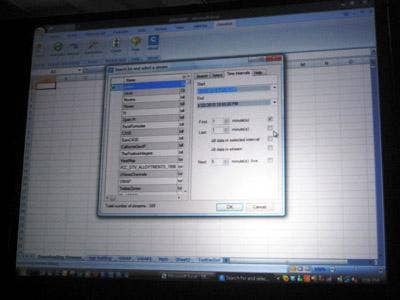
Cloudscale, San Mateo, Calif., unveiled Cloudcel, a technology which allows customers to use cloud-based technology to process huge databases in Excel in minutes.
Bill McColl, CEO and founder of Cloudscale, said Excel is the world's primary tool for managing data, but it does not work for huge data sets.
Cloudcel lets customers grab a subset of a huge Excel database sitting somewhere on a cloud, download it into a local spreadsheet in real-time, and process that data locally. Customers can also use Cloudcel to move data from their local spreadsheets or data lists to the cloud, McColl said.
In a typical data analytics task, Cloudcel can be used to build a local app, grab blocks of data from a large database, fill in the formulas, and process the data in five to ten minutes, he said.
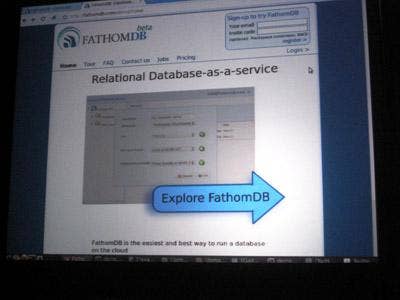
San Francisco-based FathomDB showed technology that offers customers relational databases-as-a-service where databases like MySQL can scale with using cloud-based computing.
Justin Santa Barbara, CEO and founder, said that FathomDB allows relational databases to scale in capacity using cloud-based technology instead of the expensive hardware and restrictive licensing terms required by companies like Oracle.
With FathomDB, customers can use their own application, database, and cloud provider at a low cost, letting them invest more on using the database and less on the underlying technology, Santa Barbara said.
The company plans to raise its Series A funding round in April, and is currently recruiting engineers.
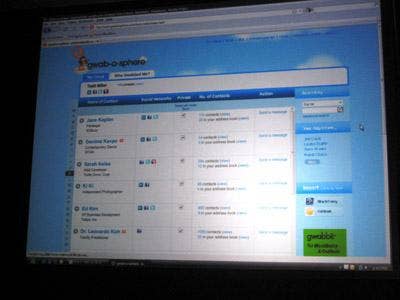
Carmel Valley, Calif.-based gwabbit introduced gwab-o-sphere, a cloud-based application for automatically updating and managing contact lists.
The name gwabbit is a play on the words "grab it" because of technology it introduced last year that automatically scans incoming e-mails for contact information and moving it to a user's address book.
The company's new application, gwab-o-sphere, automatically syncs the contact information with cloud-based content management applications like salesforce.com, Facebook, or Linked-In, said Todd Miller, company president.
If a customer's contact information changes, gwab-o-sphere automatically senses the change from the latest e-mail and give the user the option of refreshing the data, Miller said.
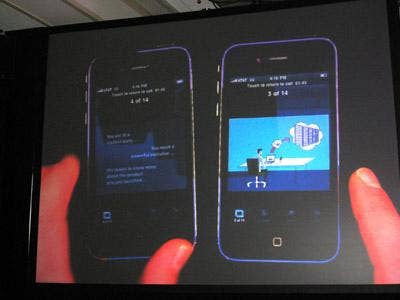
MightyMeeting, Setauket, N.Y., demonstrated a mobile collaboration app that lets users join Web meetings from their mobile devices.
Dmitri Tcherevik, CEO and founder of MightyMeeting, said customers can use their iPhone and even the upcoming iPad to set up a meeting on the cloud.
The interface is quick and easy to use, Tcherevik said. "I can be hanging on a cliff with one hand, and invite other people to the meeting with the other," he said.
Customers can schedule a meeting, choose participants from their contact book, pick a presentation, send out invites, and add the meeting to their calendars.
Because the application is based in the cloud, attendees can connect from anywhere, Tcherevik said.
MightyMeeting is the first-ever collaboration app for iPad, Tcherevik said.
He said the iPad is ideal for cloud-based presentations because of its fast processors. "So if your are an executive on a sales call, there is no reason to carry a laptop," he said. "We all know iPad will be a great entertainment device. With MightyMeeting, we turn it into a powerful business tool."
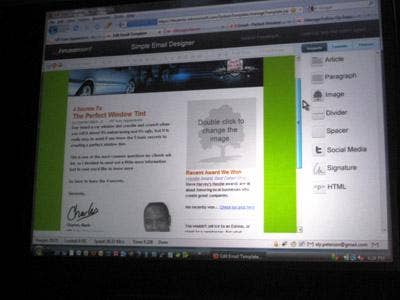
Infusionsoft, Gilbert, Ariz., demonstrated Infusionsoft Email Marketing 2.0, a cloud-based application which combines e-mail marketing with CRM.
Clate Mask, CEO and co-founder of Infusionsoft, said the application is aimed at helping small businesses improve their e-mail marketing with a number of automation features.
The application lets businesses easily build personalized e-mails with a variety of modules including video content and social marketing apps as well as the ability to change titles, text, and color.
Even more important, Mask said, Infusionsoft automates the follow-up, which has traditionally been the Achilles' Heel for small businesses.
The software provides a list of follow-up tasks such as follow-up e-mails or faxes, a coupon, a text message, or promotional materials, with the user scheduling those follow ups to automatically happen a specified number of days after the initial e-mail was sent, Mask said.

Marshall, the moderator of Demo, brought up another panel of investors, this time to talk about the challenges of investing in cloud developers.
The panelists, from left to right, included Satish Dharmaraj, partner at Redpoint Ventures; Peter Fenton, general partner at Benchmark Capital; Mike Maples, managing partner at Maples Investments; and Nancy Schoendorf, partner at Mohr Davidow Ventures.
Dharmaraj said that one advantage of being a cloud startup in today's climate is that they can experiment and fail much faster than even five years ago. Startups can create a company with little capital and tune their sales model in ways they couldn't before. They can also use social marketing to get potential customers to try their products or services, he said.
Maples said that 80 percent of what it takes to be successful comes from finding the right way do distribute product to market. "I think companies need to be more distribution-oriented from the start," he said.
The biggest problem is that every company that starts out has a lot of competitors, said Schoendorf. "And in part it's our fault, because we have too much money to invest ... Execution can make all the difference," she said.